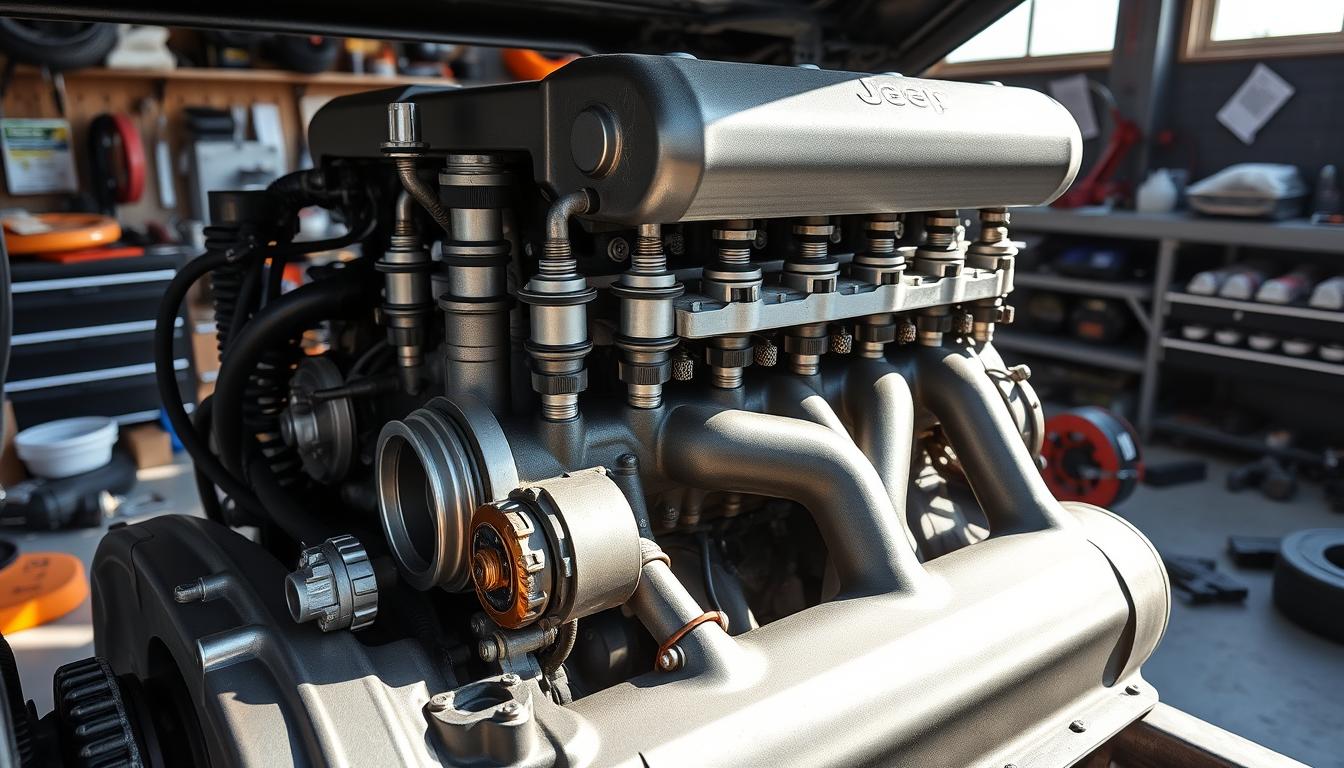The Jeep 4.7 engine is known for its strong power. Yet, it has a reputation for reliability issues, mainly in high-mileage vehicles. Problems include oil failures, overheating, and valve seat issues. Buyers should look for Jeeps with low miles or detailed service records to ensure the engine is in good shape.
The Jeep 4.7L V8 engine offers great performance but needs careful maintenance. Owners of Jeep Grand Cherokees and other models with this engine should be ready to face various issues. These can range from transfer case problems to valve seat damage from overheating.
Key Takeaways
- The Jeep 4.7 engine is known for common issues like 4WD system problems, overheating, and valve seat failures.
- Electrical problems, including broken manifold bolts and faulty sensors, can arise in high-mileage 4.7 engines.
- Routine maintenance, such as oil changes every 3,000 miles, is crucial to maintaining the 4.7 engine’s longevity.
- Potential buyers should look for low-mileage Jeeps or those with detailed service records to ensure the engine is well-maintained.
- The high-output (HO) version of the 4.7 engine may be more reliable due to its beefier internals.
Overview of the Jeep 4.7 Engine
The Jeep 4.7L V8 engine is found in many Jeep, Dodge, and Chrysler vehicles. It has enough power and torque for off-road adventures and daily driving. Yet, it has faced reliability issues, including problems with the 4.7L V8 engine, Dodge Dakota failures, and Chrysler defects.
Key Features of the 4.7 Engine
The 4.7L V8 engine is built to last. It has strong metal connecting rods, aluminum pistons, and a chain-driven camshaft. It also has an electronic fuel injection system and an electronic throttle body for better performance and fuel efficiency.
Performance Specifications
- Displacement: 4.7 liters (287 cubic inches)
- Horsepower: 235-285 hp, depending on the model year and configuration
- Torque: 295-330 lb-ft, again varying by model year and specific engine version
- Fuel economy: Can be as low as 10 MPG with larger tires and lift kits, but typically around 15-18 MPG in mixed driving conditions
Even with its power, the engine’s performance can vary. This depends on modifications, driving conditions, and maintenance. Keeping the 4.7L V8 well-maintained is key to its performance.
Engine Oil Leaks
Oil leaks are a common problem in the Jeep 4.7 engine. Several sources can cause these leaks. The valve cover gasket and oil pan gasket are often to blame.
More serious leaks can come from the crankshaft seal. This might need a professional to fix and could even require removing the engine and transmission. It’s important to check the oil, power steering, brake fluid, and coolant levels regularly. Even small leaks can turn into big problems if not caught early.
Common Causes of Oil Leaks
- Damaged or worn valve cover gasket
- Deteriorated oil pan gasket
- Faulty crankshaft seal
- Loose oil drain plug
- Improperly fitted oil filter
Signs of an Oil Leak
- Visible oil stains or drips under the vehicle
- Declining engine oil levels without any apparent consumption
- Burning oil smell or smoke coming from the engine compartment
- Oily buildup around engine components or in the engine bay
| Leak Location | Common Symptoms | Repair Recommendations |
|---|---|---|
| Valve Cover Gasket | Oil stains on the engine block, oil level decrease | Replace valve cover gasket, tighten cover properly |
| Oil Pan Gasket | Visible oil drips underneath the vehicle, oil level decrease | Replace oil pan gasket, ensure proper torque on oil pan |
| Crankshaft Seal | Extensive oil leakage, potential engine and transmission removal required | Expert diagnosis and repair, may involve engine disassembly |
| Oil Drain Plug | Oil dripping from the drain plug area | Replace drain plug, ensure proper tightening to prevent leaks |
| Oil Filter | Oil dripping from the filter housing | Replace oil filter, check for proper installation and tightening |
It’s important to tackle engine sludge buildup and oil sump issues to keep the Jeep 4.7 engine running well. Regular oil changes and using synthetic oil can help prevent these problems. Proper maintenance is key to avoiding costly repairs.
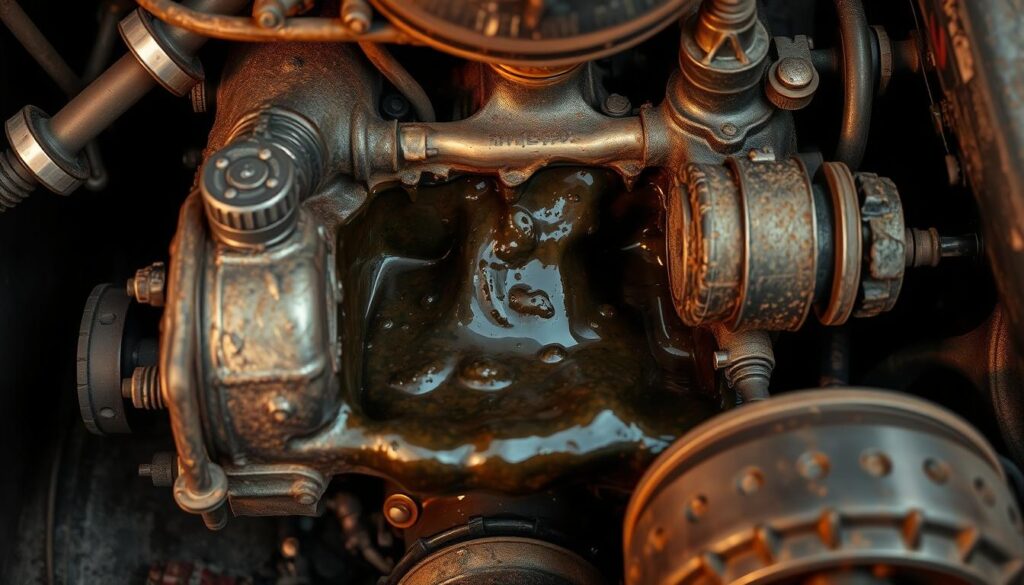
Overheating Issues
Overheating is a big problem for the Jeep Grand Cherokee’s 4.7 engine. Running the engine too hot can cause serious damage. It’s important to keep the cooling system in good shape and watch for temperature changes.
Causes of Overheating in the 4.7 Engine
Several things can make the Jeep Grand Cherokee’s 4.7 engine overheat. These include:
- Faulty or malfunctioning cooling system parts, like the water pump, radiator, or thermostat
- Coolant leaks or low coolant levels
- Blocked or restricted engine coolant passages
- Too much engine load or towing heavy loads in hot weather
Preventative Measures
To avoid overheating problems in the Jeep Grand Cherokee’s 4.7 engine, do the following:
- Regularly check and maintain the cooling system, making sure everything works right
- Check the coolant level and add more if needed, using the right type of coolant
- Avoid putting too much strain on the engine or towing heavy loads in hot weather
- Change the engine coolant as recommended by the manufacturer
By keeping the cooling system in check and watching the engine’s temperature, Jeep Grand Cherokee owners can lower the risk of expensive and serious overheating problems.
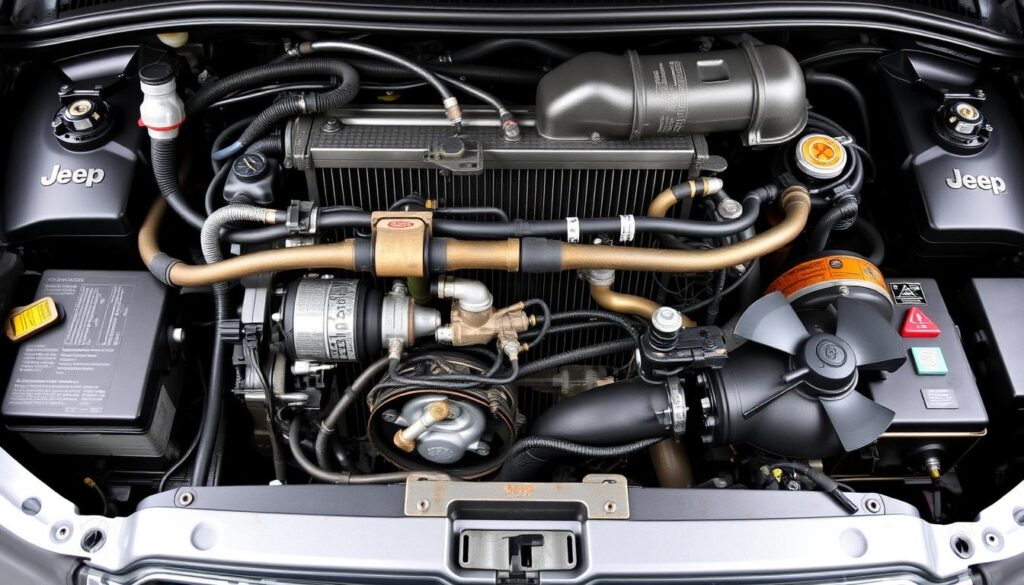
“Overheating can be the Achilles’ heel of the Jeep Grand Cherokee’s 4.7 engine, but with proper care and attention, it can be easily prevented.”
Electrical System Failures
The Jeep Grand Cherokee with the 4.7-liter engine often faces electrical system troubles. Issues range from faulty battery connections to sensor failures and spark plug problems. Regular checks and maintenance of electrical parts are key to avoiding these problems and ensuring a smooth ride.
Symptoms of Electrical Issues
Jeep Grand Cherokee drivers might notice several signs of electrical system failures. These include:
- Intermittent or complete loss of power
- Erratic behavior of dashboard gauges and warning lights
- Difficulty starting the engine
- Unexpected shutdowns or stalling
- Battery drainage or charging issues
- Malfunctioning lights, windows, or other electrical accessories
Troubleshooting Electrical Problems
When facing electrical system problems in a Jeep Grand Cherokee, quick action is essential. This might involve:
- Inspecting battery connections and replacing the battery if necessary
- Checking for any loose or damaged wiring in the engine bay and electrical system
- Diagnosing and replacing faulty sensors, such as the Mass Air Flow (MAF) sensor or Powertrain Control Module (PCM)
- Addressing issues with the ignition system, including spark plugs and coils
- Investigating and resolving any problems with the vehicle’s grounding system
By being proactive and fixing electrical issues quickly, Jeep Grand Cherokee owners can prevent further damage. This ensures their vehicle runs at its best, avoiding common issues like Jeep Grand Cherokee engine troubles and spark plug fouling.
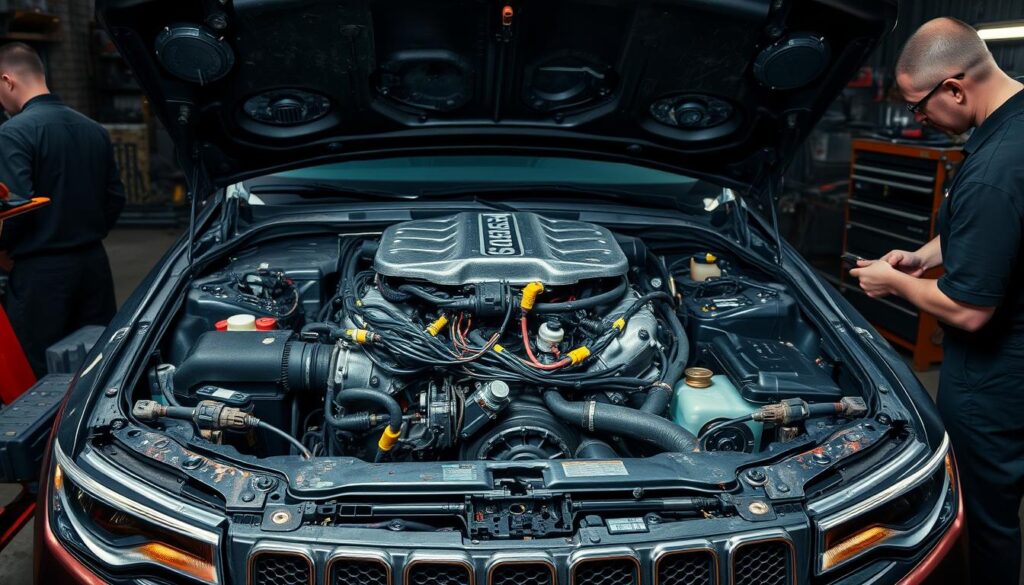
Fuel System Problems
The fuel system is key to the Dodge Dakota’s 4.7-liter engine’s performance. Faulty fuel injectors can lead to uneven fuel delivery and lower engine efficiency. This is a common issue.
Fuel pump failure is another problem. It affects fuel pressure, causing issues like hesitation and poor acceleration. Clogged fuel filters also restrict fuel flow, leading to similar problems.
Diagnosing Fuel Delivery Issues
Spotting fuel system problems can be tricky. Symptoms vary and can be linked. Common signs include:
- Hesitation or stumbling during acceleration
- Rough idling or stalling
- Decreased fuel efficiency
- Difficulty starting the engine
To fix these issues, check the fuel system thoroughly. This includes the fuel pump, lines, and injectors. Regular maintenance, like changing the fuel filter and using quality fuel, can prevent problems and keep the engine running well.
| Issue | Potential Causes | Symptoms |
|---|---|---|
| Fuel Injector Failure | – Clogged or worn injectors – Electrical issues |
– Uneven fuel delivery – Reduced engine efficiency |
| Fuel Pump Failure | – Worn or malfunctioning pump – Electrical problems |
– Hesitation or stalling – Poor acceleration |
| Clogged Fuel Filter | – Buildup of contaminants – Improper fuel quality |
– Reduced fuel flow – Decreased fuel efficiency |
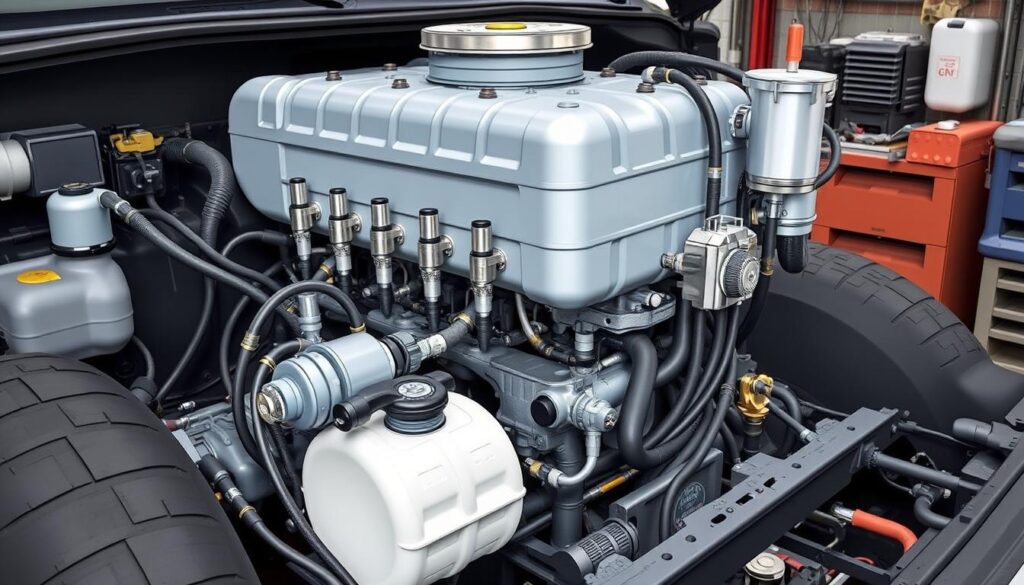
Fixing fuel system problems quickly and keeping it maintained helps Dodge Dakota owners. It ensures their 4.7-liter engines last longer and perform better.
Timing Chain Tensioner Problems
The Jeep 4.7 engine is known for its strong design. But, timing chain tensioner problems are common. The timing chain keeps the engine’s valves in sync, ensuring it runs well. If the tensioner fails, it can cause “valve train noise” and other issues.
Understanding Timing Chain Functionality
The timing chain in the Jeep 4.7 engine moves the crankshaft’s motion to the camshafts. This controls the engine’s valves. The tensioner keeps the chain tight, preventing it from slipping. If it fails, the chain can misalign, causing problems.
Signs of Timing Chain Issues
- Unusual engine noises, like on startup or during acceleration
- Misfiring or rough idling
- Decreased fuel efficiency
- Difficulty starting the engine
- Check engine light illumination
Ignoring timing chain issues can damage the engine. This includes bent valves and cylinder head damage. Regular oil changes and maintenance are key to avoiding these problems.
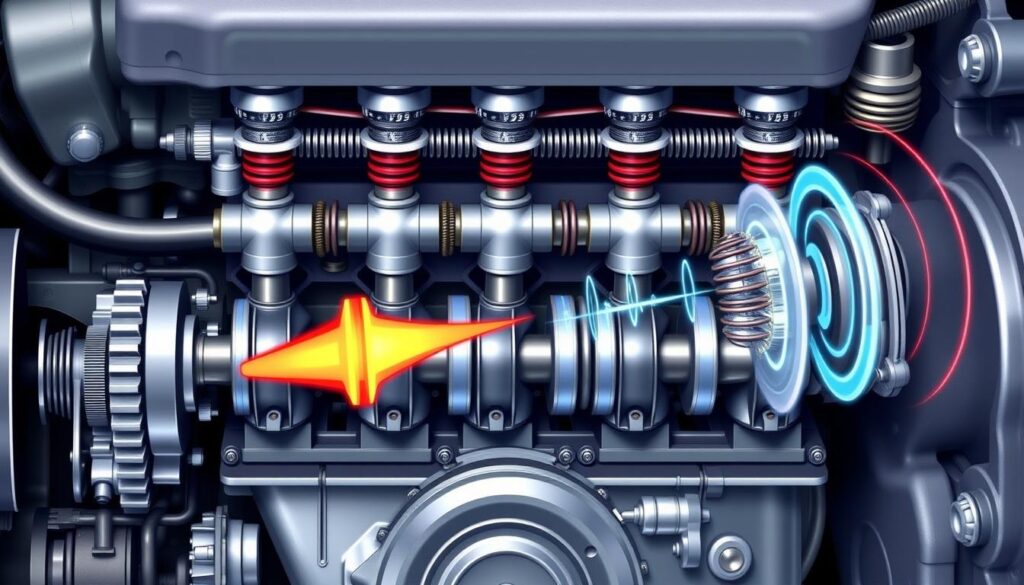
“Proper maintenance is key to avoiding the dreaded valve train noise and other Chrysler engine defects.”
Transmission Compatibility Concerns
The Jeep Grand Cherokee’s 4.7-liter engine needs to work well with its transmission. Sometimes, the engine and transmission don’t get along, causing problems. This is more common with the transfer case and full-time 4WD system in some Jeep models.
How the Engine Interacts with the Transmission
The 4.7-liter engine is made to pair well with the transmission. But, things can go wrong. Poor maintenance, wear, or the wrong upgrades can mess up the engine and transmission’s relationship. This can lead to many issues.
Common Transmission Issues with the 4.7
Transfer case problems are a big issue with the Jeep 4.7-liter engine. The full-time 4WD system can also hurt fuel efficiency. It might need extra care to run smoothly.
| Transmission Issue | Symptoms | Possible Causes |
|---|---|---|
| Transfer Case Problems |
|
|
| Full-Time 4WD System Issues |
|
|
To keep the Jeep Grand Cherokee running smoothly, it’s key to fix engine and transmission problems fast. Following the recommended maintenance schedule is also crucial.
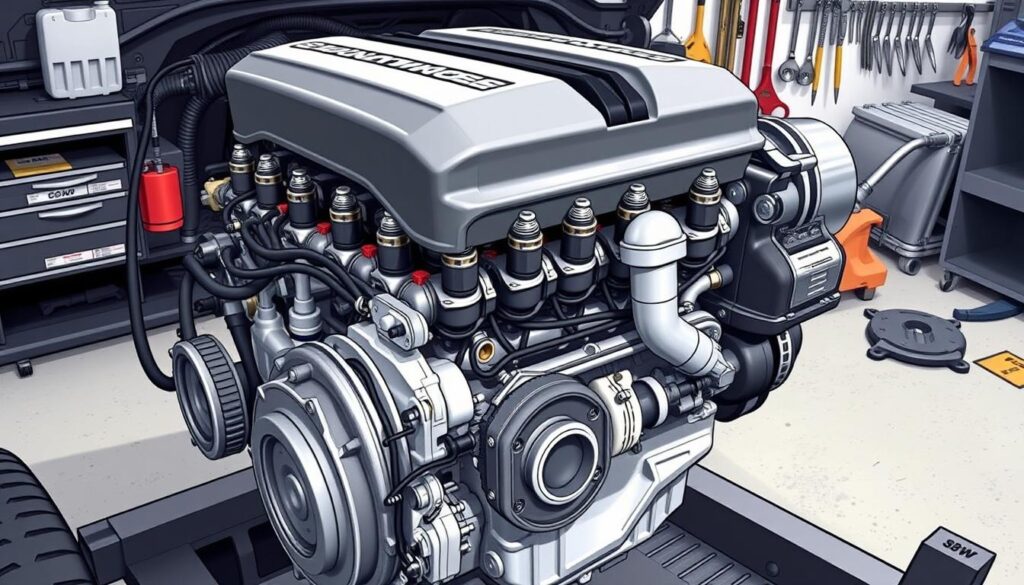
Engine Misfires
Engine misfires can be a big problem for Jeep 4.7 owners. They can cause your car to lose power and idle roughly. Knowing what causes misfires and how to spot them can help fix your Jeep fast.
Recognizing Engine Misfire Symptoms
The signs of an engine misfire in a Jeep 4.7 include:
- Rough or uneven engine idling
- Decreased acceleration and power
- Decreased fuel efficiency
- Illumination of the Check Engine Light (CEL)
- Diagnostic trouble codes such as P0300 (Random Misfire) or P030X (Cylinder-Specific Misfire)
Common Causes of Misfires
Jeep 4.7 misfires can come from many sources, like:
- Spark Plug Fouling: Worn or fouled spark plugs can stop proper ignition, causing a misfire.
- Ignition Coil Failure: A failing ignition coil can lead to a misfire in one or more cylinders.
- Fuel Delivery Problems: Issues with the fuel injectors, fuel pump, or fuel pressure regulator can cause a misfire.
- Sensor Failures: Malfunctioning sensors, such as the MAP sensor or crankshaft position sensor, can cause the engine to misfire.
- Mechanical Issues: Problems with the engine’s internal components, such as piston rings or valve train, can also lead to misfiring.
To fix engine misfires in your Jeep 4.7, find and fix the root cause. Regular maintenance, like replacing spark plugs and cleaning the fuel system, can prevent fouling and misfires.
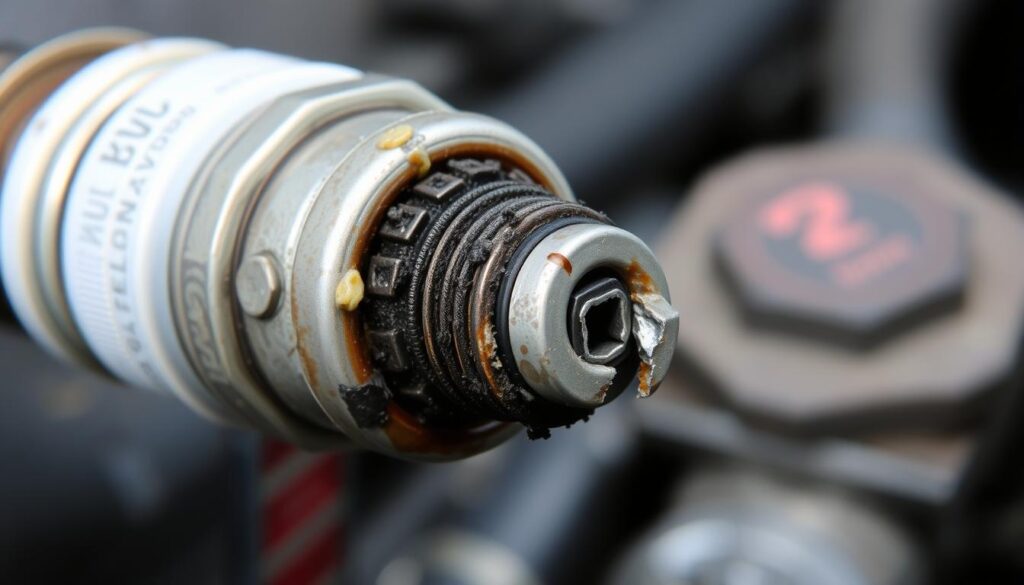
Understanding engine misfire symptoms and causes in the Jeep 4.7 helps keep your vehicle running well. This can save you from expensive repairs later.
Cooling System Deficiencies
The cooling system is key to keeping the Jeep 4.7 engine running well. But, it can face many problems. Issues like radiator leaks, thermostat failures, and water pump troubles can cause engine overheating and damage.
Importance of the Cooling System
The cooling system keeps the engine’s temperature in check. It stops the engine from overheating and helps it run smoothly. If it fails, the engine can overheat, leading to wear, loss of power, and even engine failure.
Diagnosing Cooling System Failures
Finding cooling system problems in the Jeep 4.7 engine can be tricky. The signs are often subtle at first. Common signs include:
- Overheating, often in hot weather or when the engine is under heavy load
- Coolant leaks around the radiator, water pump, or hoses
- Erratic temperature gauge readings or fluctuations
- Unusual engine noises, such as whining or grinding, from the water pump
Regular maintenance, like coolant flushes and checks, can prevent many issues. This keeps the Jeep Grand Cherokee engine healthy for a long time. Fixing these cooling system issues quickly can save you from expensive engine damage.
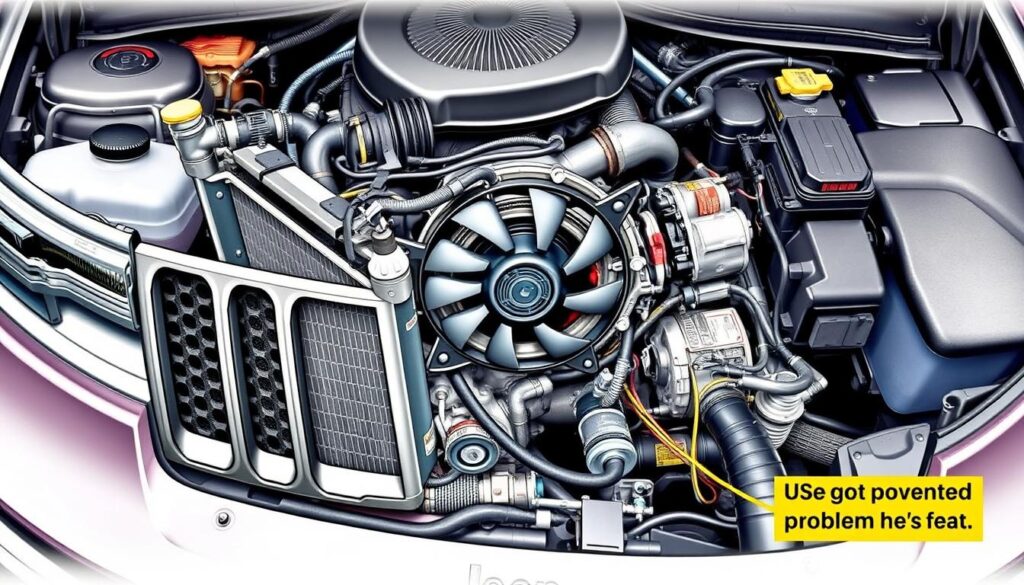
| Component | Common Issues | Symptoms |
|---|---|---|
| Radiator | Leaks, clogging, deterioration | Coolant loss, overheating |
| Thermostat | Failure to open, stuck open | Slow warm-up, temperature fluctuations |
| Water Pump | Bearing failure, impeller wear | Coolant leaks, noisy operation |
Exhaust System Issues
The Jeep 4.7 engine often faces exhaust system problems. These can affect its performance and lifespan. Issues like broken manifold bolts and leaks can reduce power and even damage the engine if not fixed.
Common Exhaust Problems in Jeep 4.7 Engines
Jeep Grand Cherokees with the 4.7L engine have seen many exhaust issues. The most common is broken exhaust manifold studs. This can cause strange sounds and lower fuel efficiency. Fixing this can cost between $450 and $1,000.
Exhaust leaks are also common. Some say the problem gets better as the engine warms up. But, these leaks can also reduce power, showing how important a good exhaust system is.
Impact of Exhaust Issues on Performance
Exhaust problems can really hurt the Jeep 4.7 engine’s performance. Cylinder head problems and Chrysler engine defects can lead to less power, worse fuel economy, and engine damage if not fixed.
These issues have been seen in many Jeep Grand Cherokees from 1999 to 2015. While some try DIY fixes, the exhaust system’s complexity means professional help is often needed. This ensures the engine runs well for a long time.
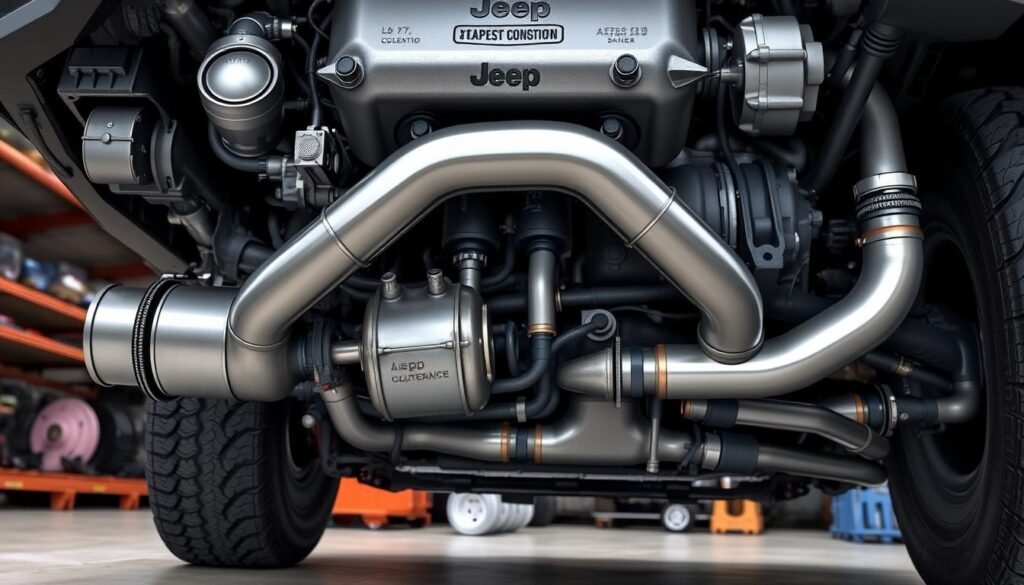
“The aftermarket warranty I purchased for $1,200, covering 60 months or 100,000 miles, was a lifesaver when the exhaust manifold on my Jeep 4.7 engine started causing problems.”
Regular Maintenance Tips
Keeping your Jeep 4.7 engine in top shape is key. Regular oil changes and using synthetic oil are musts. Also, don’t forget to flush the coolant on time to avoid sludge and overheating.
Stick to the maintenance schedule for inspections and fluid changes. This helps catch problems early and keeps your engine running well.
Best Practices for Maintaining the 4.7 Engine
Oil and filter changes every 10,000 miles or a year are vital. Replacing the cabin air filter every 12,000 miles and the engine air cleaner filter at 30,000 miles boosts efficiency.
Check the front suspension, CV/Universal joints, brake linings, and parking brake every 20,000 miles or two years. This catches issues before they get worse.
For vehicles in tough conditions, change the transfer case, front axle, and rear axle fluids every 30,000 miles or three years. Spark plugs should be replaced at 60,000 miles for the 2.0L engine and 100,000 miles for the 3.6L or 5.7L engine. This keeps the ignition working right.
Lastly, flush the engine coolant after 10 years or 100,000 miles. This keeps the engine at the right temperature.
FAQ
What are common problems with the Jeep 4.7 engine?
How does the 4.7L V8 engine perform in Jeep, Dodge, and Chrysler vehicles?
What are the common oil-related problems with the 4.7 engine?
What causes overheating issues in the 4.7 engine?
What electrical problems are common in Jeep Grand Cherokees with the 4.7 engine?
What fuel system problems can affect the 4.7 engine’s performance?
What are the common timing chain issues with the 4.7 engine?
How does the 4.7 engine’s interaction with the transmission affect its performance?
What causes engine misfires in the 4.7 engine?
How can cooling system issues affect the 4.7 engine?
What exhaust system problems can impact the 4.7 engine?
How can regular maintenance help prevent common 4.7 engine problems?

Jack Thompson is a writer and seasoned auto mechanic with over 15 years of experience in the automotive industry. Known for his expertise in vehicle mechanics, Jack has a deep understanding of car and truck systems. His skills, honed through years of hands-on experience, have made him a trusted name in the field. Jack is committed to providing valuable insights into car maintenance and repair, helping vehicle owners keep their vehicles in top condition.

